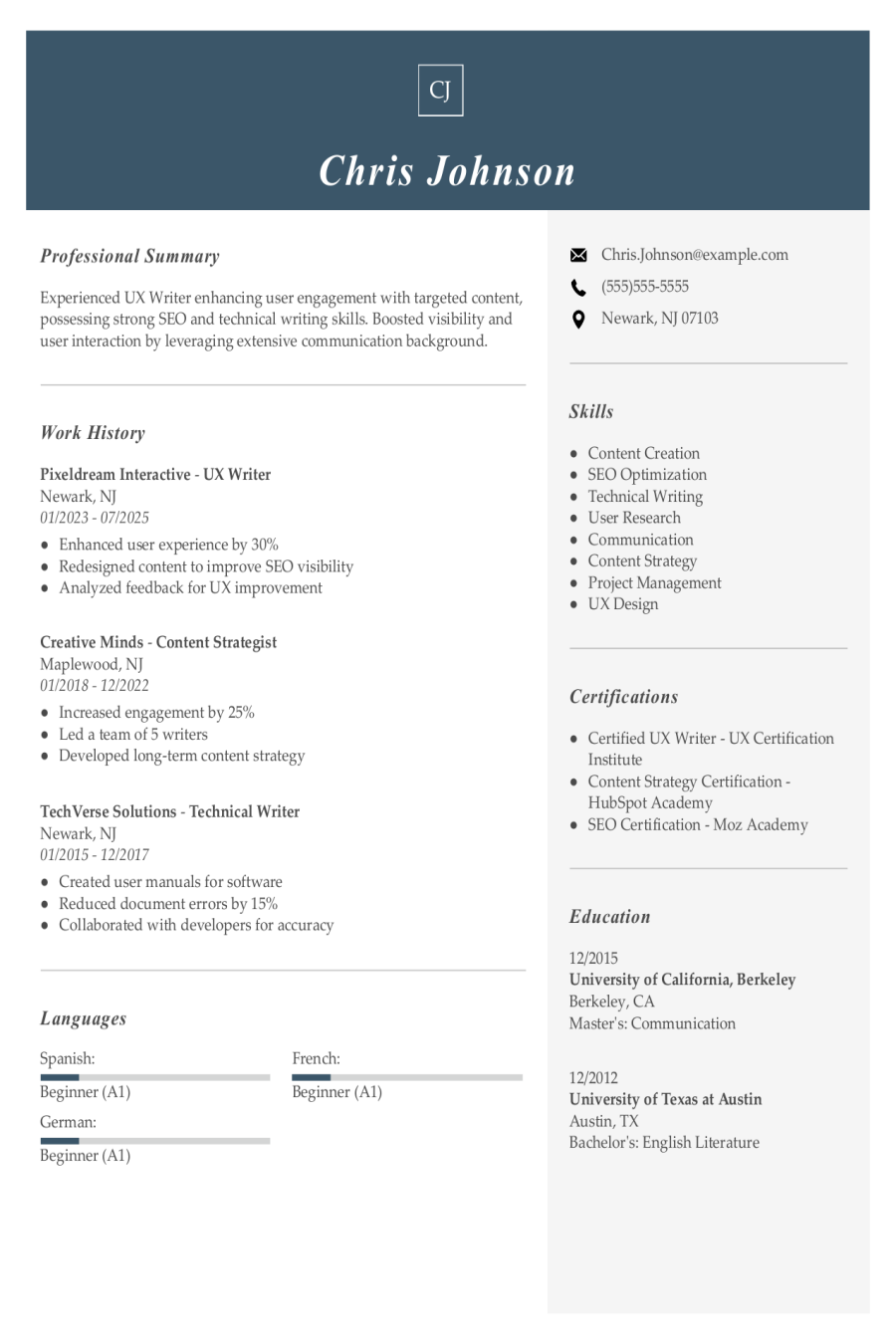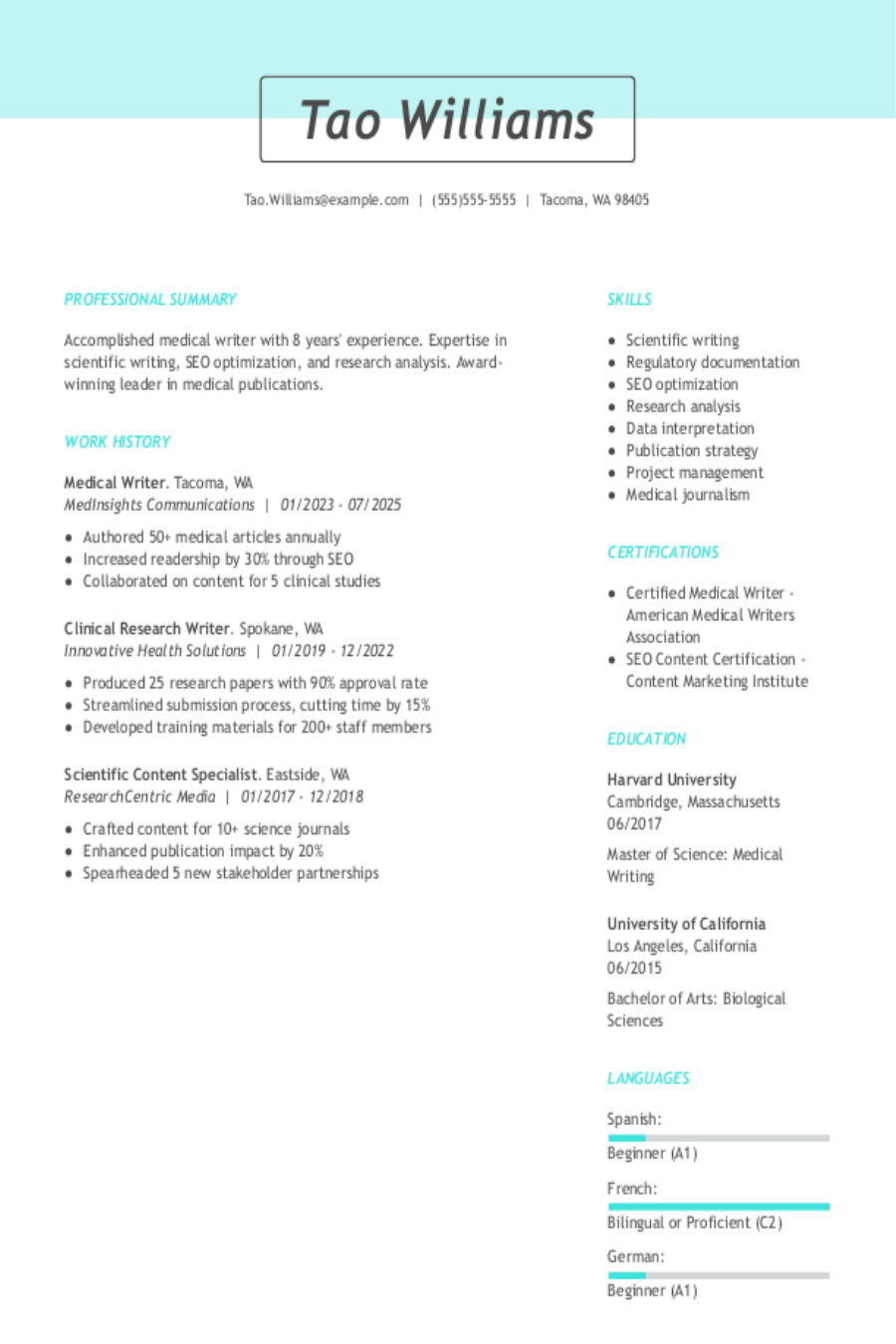Table of Contents
Get started with MyPerfectResume today!
- Build a resume on any device
- Pick an ATS-friendly template
- Tailor with AI copy suggestions
Why this resume works
- Quantifies accomplishments: The resume vividly quantifies accomplishments, like increasing web traffic by 40% and boosting social media reach by 30%, showing tangible impact through precise metrics.
- Highlights industry-specific skills: Industry-specific skills like search engine optimization (SEO) and copywriting underline the applicant’s expertise in the content creation and digital marketing sectors.
- Illustrates problem-solving ability: Problem-solving ability is shown by developing ad copy that increased sales by 20%, showcasing resourcefulness in overcoming marketing challenges.
More Writer Resume Examples
Review our writer resume examples to see how to showcase your creativity, writing expertise, and portfolio. These samples provide a strong foundation for creating a copywriting resume that puts you in the best possible light.
Entry-level Writer
Why this resume works
- Emphasizes education section: If you’re just starting out, placing your education section near the top of your resume helps highlight your most relevant qualification — your degree. This ensures employers quickly see your academic background.
- Begins with a resume objective: Resume objectives are great for entry-level candidates because they focus on career goals and enthusiasm rather than past experience. Unlike professional summaries, which highlight achievements, objectives help showcase your potential, transferable skills, and eagerness to grow in the role.
- Puts skills at the forefront: Skills are prominently listed, making it easy to identify key competencies like SEO optimization and creative writing, which are crucial for an entry-level candidate’s profile.
Mid-level Writer
Why this resume works
- Hones in on real impact: Emphasizes genuine impact by detailing achievements like boosting web traffic by 30%, clearly demonstrating the candidate’s ability to deliver measurable results.
- Includes mix of soft and hard skills: Displays a well-rounded skill set, combining technical expertise in SEO optimization with interpersonal skills through collaboration and community engagement.
- Demonstrates language abilities: Highlights multilingual abilities with English, Spanish, and French proficiency, suggesting strong cross-cultural communication skills valuable for international projects.
Experienced Writer
Why this resume works
- Showcases impressive accomplishments: The resume effectively illustrates notable accomplishments, detailing significant increases in readership and traffic, underscoring the candidate’s senior-level impact in writing and content development.
- Lists relevant certifications: Relevant certifications such as Advanced Creative Writing Certificate and Professional SEO Certification highlight continuous learning and specialized expertise, enhancing the candidate’s profile.
- Sections are well-organized: Clear headers and bullet points are used throughout, making each section easy to scan and ensuring that key information stands out for quick reference.
Writer Resume Template (Text Version)
Min Lee
Oakridge, OR 97463
(555)555-5555
Min.Lee@example.com
Professional Summary
Experienced writer and content creator with a Master’s in Creative Writing. Proven track record in increasing web traffic by 40% and boosting social media reach by 30%. Highly skilled in SEO Optimization, Copywriting, and Proofreading.
Work History
Writer
Creative Content Solutions – Oakridge, OR
January 2023 – March 2025
- Authored 50+ articles monthly for various clients.
- Increased web traffic by 40% with SEO-optimized content.
- Edited and proofread documents, enhancing clarity.
Content Creator
Media Nexus – Portland, OR
January 2021 – December 2022
- Created engaging posts, boosting social media reach by 30%.
- Collaborated with designers to produce multimedia content.
- Managed content calendar, ensuring timely delivery.
Copywriter
AdPro Marketing – Portland, OR
January 2020 – December 2020
- Developed ad copy, leading to a 20% increase in sales.
- Worked with clients to understand their brand voice.
- Produced clear, compelling copy for various mediums.
Skills
- Content Writing
- SEO Optimization
- Creative Writing
- Copywriting
- Proofreading
- Content Management
- Social Media Content
- Audience Research
Education
Master’s Creative Writing
University of California Los Angeles, CA
May 2019
Bachelor’s English Literature
University of Texas Austin, TX
May 2017
Certifications
- SEO Specialist Certification – Google
- Content Marketing Certification – HubSpot Academy
- Copywriting Essentials – American Writers & Artists Inc.
Languages
- English – Beginner (A1)
- Spanish – Beginner (A1)
- French – Intermediate (B1)
Popular Skills for a Writer Resume
A well-designed resume skills section is essential for demonstrating the technical abilities and personal qualities necessary to succeed as a writer. Emphasizing hard skills like grammar proficiency alongside soft skills such as creativity helps you shine in this competitive industry.
Below are a few of the top soft skills frequently listed on resumes made by MyPerfectResume users.
| Soft Skills | % of resumes with this skill |
|---|---|
| Strong research skills | 32.69% |
| Idea brainstorming | 16.22% |
| Creative collaboration | 12.24% |
| Exceptional storytelling | 10.47% |
| Effective writing | 9.80% |
Here are a few examples of hard skills frequently included on writer resumes.
| Hard Skills | % of resumes with this skill |
|---|---|
| Creative writing | 43.22% |
| Editing | 35.83% |
| Grammar usage | 27.12% |
| Research | 14.58% |
| Content creation | 14.41% |
Related Resume Guides
Advice for Crafting Your Writer Resume
Trying to figure out how to make a resume as a writer? I’ve got you covered with tips on showcasing your creativity, storytelling skills, and unique voice. Let’s make sure your resume grabs attention and shows exactly what you bring to the table.
Showcase your portfolio or projects
For a writer, showcasing a portfolio or listing projects on your resume is crucial. This not only exhibits your writing talent but also emphasizes your adaptability and creativity.
Employers seek samples of your work to determine if your style and skills align with their requirements. Providing links to an online portfolio on platforms like Behance, Dribbble, or a personal website facilitates easy access for them to evaluate your top pieces.
You can present various types of projects in your showcase, including freelance tasks, academic assignments, and side ventures — all of which demonstrate your breadth as a writer. Each project should be structured similarly to a job entry:
This structure enables employers to quickly grasp the context of each work, understand your specific role, and see the impact you made. Organizing your portfolio in this manner makes it easier for potential employers to appreciate the value you offer as a writer.
Example of a projects section
Travel Blog Content Series
Wanderlust Chronicles
March 2023 – July 2023
- Authored a series of in-depth travel blog posts, increasing website traffic by 30%.
- Collaborated with photographers and designers to produce visually appealing content.
- Conducted extensive research on various destinations to provide accurate and engaging information.
E-book Ghostwriting for Health Expert
Healthy Living Co.
June 2022 – December 2022
- Ghostwrote a comprehensive e-book on holistic health practices, which became an Amazon bestseller.
- Interviewed the client extensively to capture their voice and expertise accurately.
- Managed the entire project from outline creation to final editing and formatting.
Need help with your resume? Check out these professional resume examples to get ideas and make your resume shine.
Emphasize your most relevant skills
As a writer, it’s important to highlight both your technical and soft skills. Technical skills like proficiency in writing software (such as Microsoft Word, Google Docs, or Scrivener) show that you can use the tools needed for the job. Meanwhile, soft skills like creativity, attention to detail, and strong communication are just as impiortant.
Consider adding a dedicated Skills section on your resume. In this section, list software proficiencies and artistic abilities clearly. For example, you can include Microsoft Word, Google Docs, SEO writing, and creative writing. Then, weave these skills into your work experience bullet points for a stronger impact.
Instead of just saying you wrote articles, mention that you used SEO techniques to increase web traffic or collaborated with a team to produce high-quality content. This approach shows not only what you’ve done but also how well you’ve done it using your skills.
Using the right keywords from the job posting can help your resume get through applicant tracking systems (ATS) and catch the eye of recruiters.
Choose a professional resume template
When choosing a resume template for a writer, aim for one that blends creativity with professionalism. Opt for a clean, structured template featuring clear headings and minimal decoration to ensure your resume stands out without detracting from the content.
Ensure the format is ATS-friendly by using standard fonts like Arial or Times New Roman and steering clear of graphics or unconventional layouts. Arrange sections logically: begin with contact information, then a summary, followed by work experience, skills, and education. Use bullet points to highlight achievements for easy readability.
Customize your resume for the writer role by emphasizing relevant writing projects and accomplishments. Employ strong action verbs such as “authored,” “edited,” or “published” to detail your work. This method highlights your creative talents professionally while making it accessible for both humans and software to evaluate your qualifications.
Easily create a standout resume with our Resume Builder. Choose a template, add your details, and get a professional resume fast.
Format your resume properly
Using the appropriate resume format ensures your resume is both readable and professionally attractive. Writers with extensive experience should consider a chronological layout to clearly present their career development. Arrange sections with distinct headings, list positions in reverse order, and emphasize accomplishments using bullet points. This method effectively showcases your writing skills and consistent advancement in the industry.
5 resume formatting tips
- Organize sections clearly: Use clear headings like Work Experience, Skills, and Portfolio for easy navigation.
- Choose a consistent font: Select a readable resume font like Arial, Calibri, or Times New Roman in 10-12 pt size.
- Use bullet points: Break down job duties and achievements into concise bullet points for readability.
- Aim for one page: Keep your resume to one page unless you have extensive experience.
- Ensure proper spacing and alignment: Maintain consistent margins and spacing for a clean, professional appearance.
Make sure your resume gets seen! Use our ATS Resume Checker to find and fix issues that might keep it from getting through the hiring system.
Salary Insights for Writers
Top 10 highest-paying states for writers (new data)
Writers earn varying salaries across the United States, with a national average of $72,060. The table below highlights the states where writers command the highest compensation.
Our salary information comes from the U.S. Bureau of Labor Statistics’ Occupational Employment and Wage Statistics survey. This official government data provides the most comprehensive and reliable salary information for writers across all 50 states and the District of Columbia. The figures presented here reflect the May 2025 dataset, which is the most recent available as of this publication.
| State | Average Salary |
|---|---|
| District of Columbia | $122,310 |
| New Mexico | $99,610 |
| Virginia | $87,920 |
| Vermont | $83,240 |
| Oregon | $82,340 |
| Hawaii | $81,690 |
| Georgia | $78,720 |
| Alaska | $75,610 |
| Idaho | $71,280 |
| Rhode Island | $69,640 |
FAQ
Do I need to include a cover letter with my writer resume?
Including a cover letter with your writer resume is a smart move. Cover letters allow you to immediately showcase your writing skills and express your enthusiasm for the role and the company. You can highlight key achievements, explain unique career paths or gaps, and provide context for your work samples.
Tailor each cover letter to the job you’re applying for by mentioning why you’re interested in that specific publication or company and how your experience meets their needs. This personal approach can distinguish you from other candidates and demonstrate genuine interest in the position. For help crafting a truly personalized cover letter, consider using our Cover Letter Generator or reviewing our library of cover letter examples.
How long should a writer’s resume be?
A writer’s resume length should usually should be one page, especially if you’re just starting out. This keeps it short and helps hiring managers quickly spot your main skills and achievements.
That being said, if you have a lot of experience or many publications, a two-page resume is better at showing the full scope of your work. Focus on highlighting recent projects, writing credits, and any special skills like SEO or technical writing for maximum impact.
How do you write a writer resume with no experience?
Crafting a resume without formal experience can be tricky, but it’s about emphasizing your skills and relevant activities. Here’s how to do it:
- Highlight your education: Include any degrees or courses in English, journalism, creative writing, or related fields. Specify classes or projects where you developed your writing skills.
- Showcase your work: Provide links to personal blogs, online articles, or freelance work. If you lack published pieces, consider creating a portfolio with diverse samples like essays, short stories, or mock articles.
- Focus on transferable skills: Highlight abilities such as excellent grammar, creativity, research proficiency, and attention to detail — essential for any writing job.
- Include relevant experiences: Mention internships, volunteer roles, or participation in literary clubs that utilized your writing skills. Managing social media accounts or contributing to newsletters also counts!
- Tailor each resume: Adapt it for every job by incorporating keywords from the job description to demonstrate that you understand the role and its requirements.
Finally, don’t forget to network. Engage with other writers and industry professionals on platforms like LinkedIn to discover opportunities and gain field insights.
Rate this article
Writer
Share this page
Additional Resources

Technical Writer Resume Examples & Templates
Technical writers need resumes that focus on clear communication, organizing complex information, and teamwork. Discover tips to showcase how you make tech info easy for everyone to understand.Build my resumeImport

Copywriter Resume Examples & Templates
A great copywriter resume should show how you create engaging content, understand audiences, and tell stories. These examples can help you showcase your creativity and communication skills.Build my resumeImport existing

UX Writer Resume Examples & Templates
Check out UX writer resume examples and learn how to spotlight storytelling, user empathy, and clear communication.Build my resumeImport existing resumeCustomize this templateWhy this resume worksQuantifies accomplishments: By pulling metrics

Medical Writer Resume Examples & Templates
Discover medical writer resume examples and tips that will help you highlight your experience in research, communication, and document creation.Build my resumeImport existing resumeCustomize this templateWhy this resume worksQuantifies accomplishments: By

Creative Writer Resume Examples & Templates
Discover creative writer resume examples and learn tips to highlight your unique voice and relevant projects in a clear, compelling way.Build my resumeImport existing resumeCustomize this templateWhy this resume worksQuantifies

